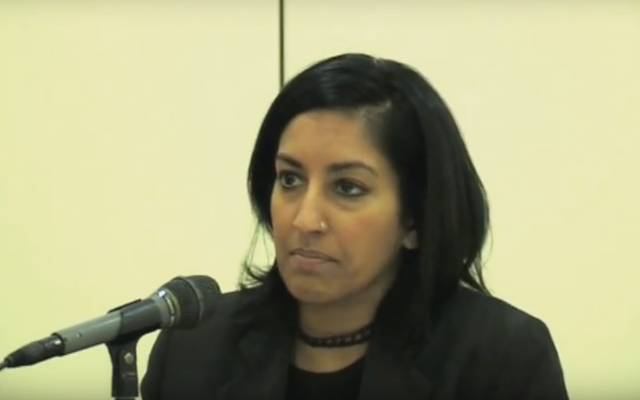Jasbir Puar, “a notorious slanderer of the Israeli regime,” is claiming in a pseudo-academic book that the Jewish state physically debilitates Palestinians in order to control them.
By: Shiri Moshe/The Algemeiner
A professor with a history of supporting terrorism against Israelis is publishing a new book accusing the Jewish state of physically debilitating Palestinians in order to control them.
The Right to Maim: Debility, Capacity, Disability, authored by Jasbir Puar — associate professor of women’s and gender studies at Rutgers University — argues in part that the “Israeli Defense Forces (IDF) have shown a demonstrable pattern over decades of sparing life, of shooting to maim rather than to kill.”
According to the Rutgers professor, this “purportedly humanitarian practice of sparing death by shooting to maim” is part of a “logic long present in Israeli tactical calculations of settler colonial rule—that of creating injury and maintaining Palestinian populations as perpetually debilitated, and yet alive, in order to control them.”
The Right to Maim is set to be published by Duke University Press in November 2017, and was the topic of Puar’s lectures at Stanford University and Rutgers University this year. A copy of its introduction can be found at the Duke University Press website.
Puar’s latest claims appear similar to those she shared during a controversial, faculty-sponsored event at Vassar College in February 2016, when she said that Israel “manifests an implicit claim to the right to maim and debilitate Palestinian bodies and environments,” according to a transcript of the talk provided by the Vassar alumni group Fairness To Israel.
During that appearance, Puar repeated allegations that the bodies of “young Palestinian men … were mined for organs for scientific research.” She also asserted that Israel’s actions can be called a “genocide in slow motion,” and said, “we need [the Boycotts, Divestment, and Sanctions movement] as part of organized resistance and armed resistance in Palestine as well. There is no other way the situation is going to change.”
Kenneth Waltzer, executive director of the Academic Engagement Network, questioned the empirical foundation on which Puar based her latest work, calling her “a notorious slanderer of the Israeli regime.”
“Puar is more interested in defining and theorizing than in getting things as they are,” Waltzer told The Algemeiner. “She also dangles the hint of a second dispossession, a second Nakba, by Israel, but is there evidence of a decline of the Palestinian population? Isn’t the Palestinian population growing under this biopolitical regime?”
“On the other hand,” he noted, “I see little sign based on the sections I have before me in the new book of the terrible (and unapologetic) antisemitism Puar clearly exhibited when she spoke at Vassar in early 2016.”
Asaf Romirowsky, executive director of Scholars for Peace in the Middle East, observed that Puar’s work represents “exactly the kind of pseudo-scholarship and quasi-academic integrity that we deal with on many campuses, specifically in the humanities, where you see individuals who come up with these ‘theories’ and try to sell them.”
“The fact that she’s receiving a platform to promote this stuff, that you’re seeing a university press like Duke accepting it as legitimate scholarship, are all big concerns that we’ve been raising for years,” Romirowsky said in an interview with The Algemeiner. “Here you’re seeing the clear transformation of where propaganda — Arab, Palestinian propaganda — has basically replaced any sense of scholarship.”
He pointed out that when a book like Puar’s is published through a university press, “it immediately gets the [appearance] of scholarship, thereby it gets inserted into a syllabi as a secondary source or whatever source that is out there, thus getting it into the system.”
“That’s a bigger program,” Romirowsky warned, “as far as what passes as scholarship versus propaganda.”
